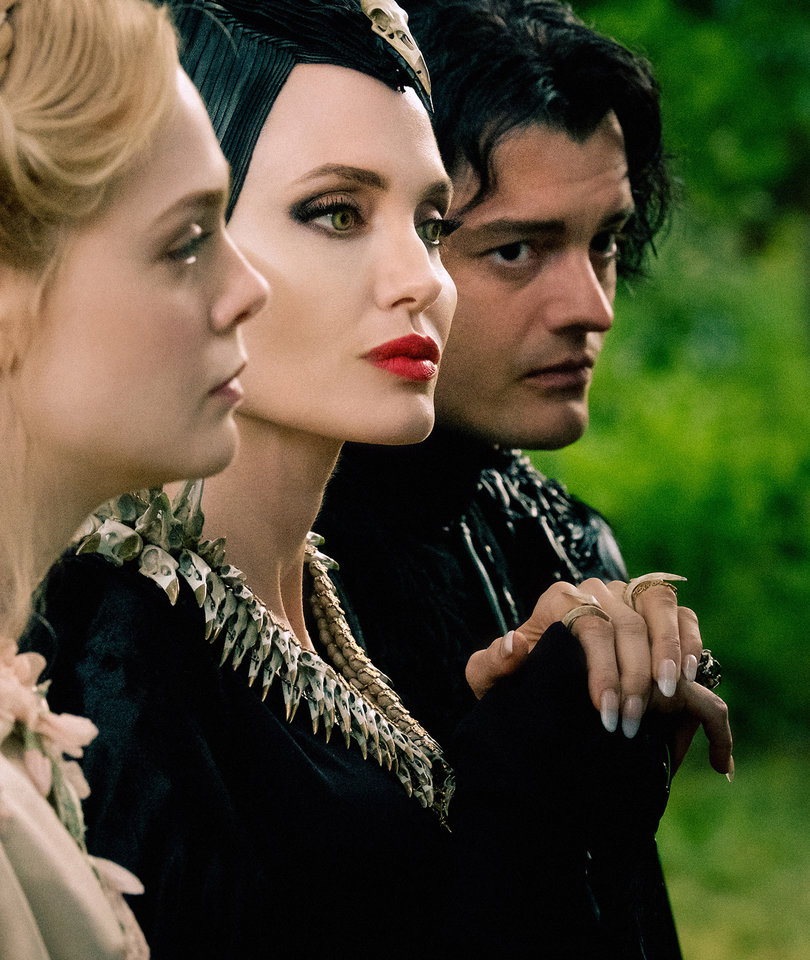Maleficent: Mistress of Evil (2019)

DIRECTOR: Joachim Ronning
CAST: Angelina Jolie, Elle Fanning, Michelle Pfeiffer, Harris Dickinson, Chiwetel Ejiofor, Ed Skrein, Sam Riley, Imelda Staunton, Juno Temple, Lesley Manville, Robert Lindsay, David Gyasi, Warwick Davis
REVIEW:
2014’s Maleficent, a “reimagining” of the Sleeping Beauty fairy tale which turned the story on its head by casting Maleficent more as a wronged tragic anti-heroine than cackling villainess, was a lightweight and mediocre fantasy adventure, but it did well enough at the box office to warrant a sequel. Nevertheless, Maleficent: Mistress of Evil will likely appeal to the same audience who enjoyed the first movie and likewise not convert those who were unimpressed. Despite a somewhat “bigger” story and expanded world-building, it doesn’t take things appreciably further than its modestly successful predecessor.
With its reworked version of Sleeping Beauty told last installment, we’ve now left the original fairy tale inspiration entirely behind and waded into uncharted territory. Princess Aurora (Elle Fanning), the adoptive daughter of the dark fairy Maleficent (Angelina Jolie), has accepted the hand of her beau Prince Philip (Harris Dickinson, replacing Brenton Thwaites), over Maleficent’s deep distrust of humans (besides the one exception she’s made for Aurora herself, of course). At Aurora’s goading, Maleficent grudgingly agrees to a “meeting the in-laws” dinner at Philip’s family castle with his parents, King John (Robert Lindsay) and Queen Ingrith (Michelle Pfeiffer), but the hoped-for alliance finally brokering peace between the human and fairy kingdoms is thwarted when Maleficent, needled and provoked by Queen Ingrith, seemingly curses King John to fall into the eternal sleep that once befell Aurora. As Maleficent is leaving, she is shot down by an assassin’s crossbow, but is rescued by her long-lost own kind and whisked away to a hidden colony of the last remaining dark fairies, including angry young warrior Borra (Ed Skrein), who’s itching to go to war with the humans, and Conall (Chiwetel Ejiofor), who hopes Maleficent’s relationship with Aurora can prevent exactly that. Meanwhile, Queen Ingrith hatches plans of her own.
One of the strengths of Maleficent was the eye candy of director Robert Stromberg, and while his replacement Joachim Ronning doesn’t have quite the same level of visual flair, there’s still striking moments, especially the effervescent magical creatures of the forest and the diverse tribal designs of the dark fairies. Maleficent being reunited with the rest of her kind expands the world-building and mythos, but while the narrative aspires to be somewhat more ambitious than its predecessor (and dispenses with the first movie’s tiresomely continuous narration), it remains too facile and simplistic to amount to much. There’s a climactic battle, but this being a family-friendly film, it’s suspiciously bloodless and far too easily and neatly resolved and comes off as Game of Thrones-lite (not a favorable comparison for this movie to invite on itself). An evil scheme amounting to outright ethnic cleansing and genocide is hatched, but in the end everyone joins hands and sings kumbaya (figuratively). Children won’t care—-or notice—-but the movie’s facile treatment of such a serious theme might rub some adults the wrong way.
Angelina Jolie plays Maleficent the same as she did last time, with a commanding presence, cheekbones that could cut glass, and the sense that she’s being held back by the anti-heroine angle. One could easily imagine Jolie being a deliciously wicked Maleficent in a “straight” rendition of Sleeping Beauty; she was never more witchy fun in the first movie than when she was allowed, however fleetingly, to go bad and give a wicked cackle. Alas, here she’s even less “evil” than before (making the title Mistress of Evil rather ill-fitting). That leaves the villainess duties to a chilly Michelle Pfeiffer, who seems to be enjoying herself stalking around in evil queen mode (though her comeuppance is facile and arguably less than she deserves). One is left somewhat underwhelmed that Jolie and Pfeiffer don’t get more of a chance to square off. Elle Fanning, who was relegated to a bland ray of sunshine last time, gets a somewhat more substantial role here as Aurora is torn between her “wicked” mother figure and her seemingly benevolent new mother-in-law whose motives she eventually doubts. Harris Dickinson replaces Brenton Thwaites (who’s busy playing Dick “Robin” Grayson on the Titans television series), but they’re equal in their wooden blandness, so casual viewers might not even notice the difference. Chiwetel Ejiofor brings an authoritative presence to the leader of the dark fairies, though he’s onhand for little more than exposition. The three bumbling fairies—Imelda Staunton, Lesley Manville, Juno Temple—are still onhand, but their roles have been reduced, which is a good thing as they feel even more out of place here than they did last time.
If you enjoyed Maleficent, you may likewise appreciate Mistress of Evil. If you were unimpressed, you’re likely to have the same reaction here. The sequel arguably makes an attempt to tackle weightier themes—no less than ethnic cleansing—but the half-assed and simplistic way it fumbles the ball raises the argument that it would have been better off avoiding them.
**1/2